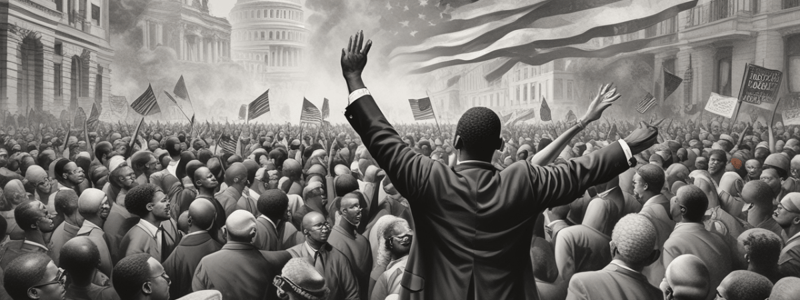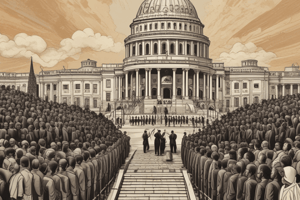Podcast
Questions and Answers
What event led to international outcry and national protests during the Kennedy administration?
What event led to international outcry and national protests during the Kennedy administration?
- The Freedom Rides
- JFK's national address
- James Meredith's university application
- Protests in Birmingham, Alabama (correct)
What was the primary focus of the proposed civil rights legislation?
What was the primary focus of the proposed civil rights legislation?
- Strengthening the Attorney General's authority
- Protecting voting rights
- Preventing discrimination in all institutions
- Outlawing discrimination in public facilities (correct)
Who worked with President Lyndon Johnson to secure crucial votes for the Civil Rights Act?
Who worked with President Lyndon Johnson to secure crucial votes for the Civil Rights Act?
- The Attorney General
- Everett Dirksen (correct)
- James Meredith
- Martin Luther King Jr.
What event led to President Lyndon Johnson prioritizing the Civil Rights Act?
What event led to President Lyndon Johnson prioritizing the Civil Rights Act?
When was the Civil Rights Act signed into law?
When was the Civil Rights Act signed into law?
What was President Lyndon Johnson's strategy to secure the passage of the Civil Rights Act?
What was President Lyndon Johnson's strategy to secure the passage of the Civil Rights Act?
What was the significance of the Civil Rights Act to President Lyndon Johnson?
What was the significance of the Civil Rights Act to President Lyndon Johnson?
What was the primary goal of the 1964 Civil Rights Act?
What was the primary goal of the 1964 Civil Rights Act?
What was the outcome of the Supreme Court's ruling in Brown v. Board of Education in 1954?
What was the outcome of the Supreme Court's ruling in Brown v. Board of Education in 1954?
Why were African Americans unable to exercise their voting rights despite some efforts to address racial issues?
Why were African Americans unable to exercise their voting rights despite some efforts to address racial issues?
What was the name of the incident that drew attention to racial injustices in 1955?
What was the name of the incident that drew attention to racial injustices in 1955?
What was the purpose of advocacy groups like the NAACP and CORE?
What was the purpose of advocacy groups like the NAACP and CORE?
What did President Eisenhower do in 1957?
What did President Eisenhower do in 1957?
What was the outcome of the desegregation crisis in Little Rock High School in Arkansas?
What was the outcome of the desegregation crisis in Little Rock High School in Arkansas?
Flashcards
1964 Civil Rights Act
1964 Civil Rights Act
Abolished segregation in public places and employment discrimination based on race, color, religion, sex, or national origin.
Jim Crow Laws
Jim Crow Laws
Laws enforcing racial segregation in the Southern United States.
De facto segregation
De facto segregation
Segregation that existed because of social and economic factors.
Civil Rights Advocacy Groups
Civil Rights Advocacy Groups
Signup and view all the flashcards
Brown v. Board of Education (1954)
Brown v. Board of Education (1954)
Signup and view all the flashcards
Eisenhower's Action in Little Rock (1957)
Eisenhower's Action in Little Rock (1957)
Signup and view all the flashcards
Freedom Rides
Freedom Rides
Signup and view all the flashcards
James Meredith's University Application
James Meredith's University Application
Signup and view all the flashcards
JFK's Civil Rights Address
JFK's Civil Rights Address
Signup and view all the flashcards
Civil Rights Act Priority
Civil Rights Act Priority
Signup and view all the flashcards
Study Notes
- The 1964 Civil Rights Act was the most significant piece of legislation in 20th-century US history, aimed at removing systemic racial prejudice.
- Between the American Civil War and the first Reconstruction, segregation was established through Jim Crow laws, separating public facilities, washrooms, water fountains, hotels, and jobs, with the justice system favoring whites.
- Segregation in the South was legally sanctioned, while de facto segregation existed in the North, limiting blacks' access to quality housing and jobs.
- Advocacy groups like the National Association for the Advancement of Colored People, Congress of Racial Equality, Southern Christian Leadership Conference, and Student Nonviolent Coordinating Committee formed to lobby the government and coordinate protests.
- Despite some efforts, the federal government did little to address racial issues, with southern politicians vetoing legislation and blacks unable to exercise their voting rights.
- Landmark events like the murder of Emmett Till, the attempted integration of the University of Alabama, and the Montgomery bus boycott drew attention to racial injustices.
- The Supreme Court's 1954 ruling in Brown v. Board of Education declared segregation in public schools unconstitutional, paving the way for desegregation crises.
- In 1957, President Eisenhower deployed federal troops to integrate Little Rock High School in Arkansas.
- The Kennedy administration faced racial crises, including the Freedom Rides, James Meredith's university application, and protests in Birmingham, Alabama, which led to international outcry and national protests.
- JFK's national address called for civil rights legislation, committing the federal government to action.
- The proposed legislation aimed to outlaw discrimination in public facilities, protect voting rights, strengthen the Attorney General's authority, and prevent discrimination in federally funded institutions.
- After JFK's assassination, President Lyndon Johnson prioritized the Civil Rights Act, recognizing its significance in honoring Kennedy's memory.
- Johnson dislodged the tax bill, cleared the way for the Civil Rights Act, and worked with Everett Dirksen to secure crucial votes, leading to the bill's passage in the Senate and its signing into law on July 2, 1964.
Studying That Suits You
Use AI to generate personalized quizzes and flashcards to suit your learning preferences.




